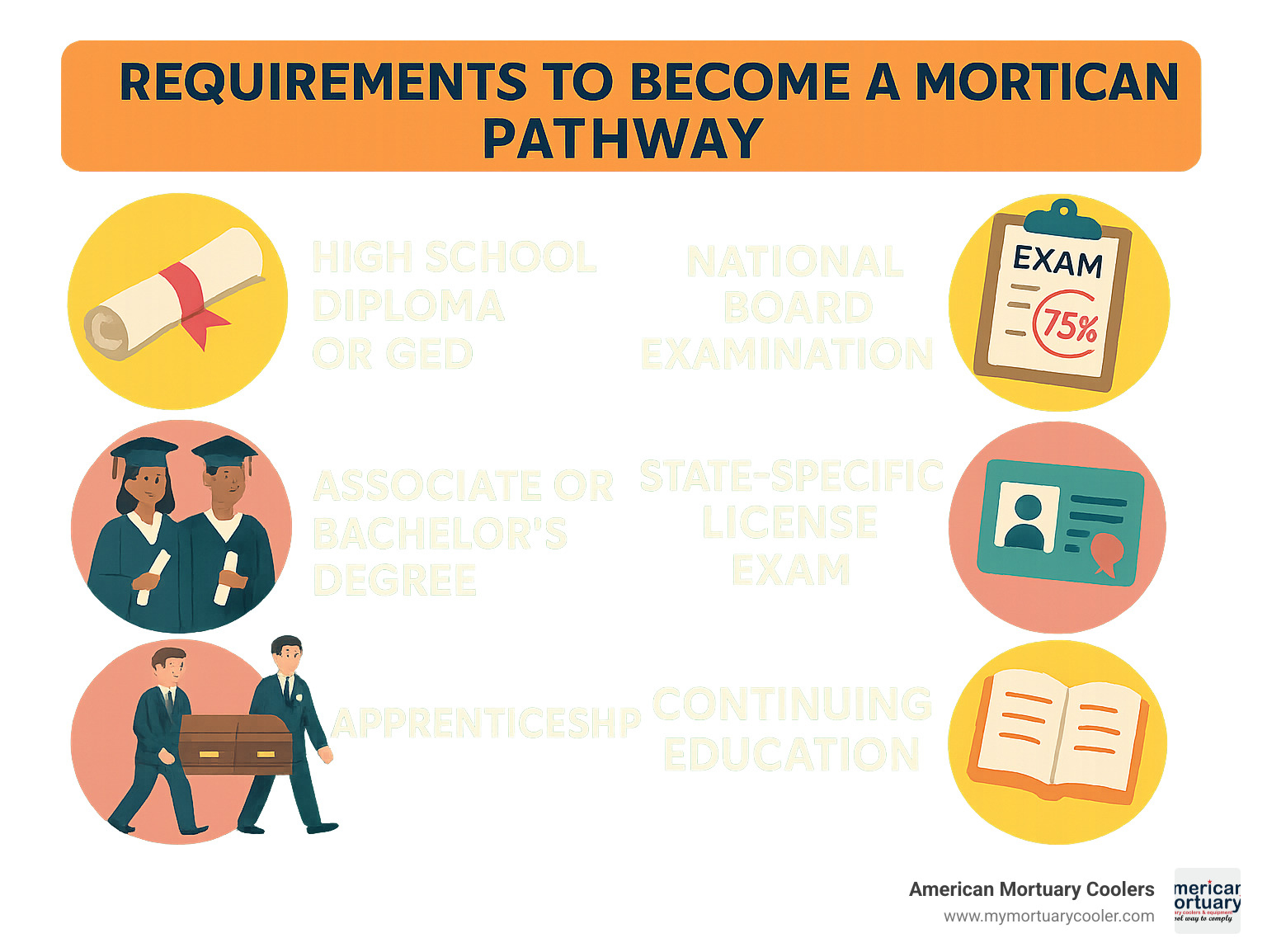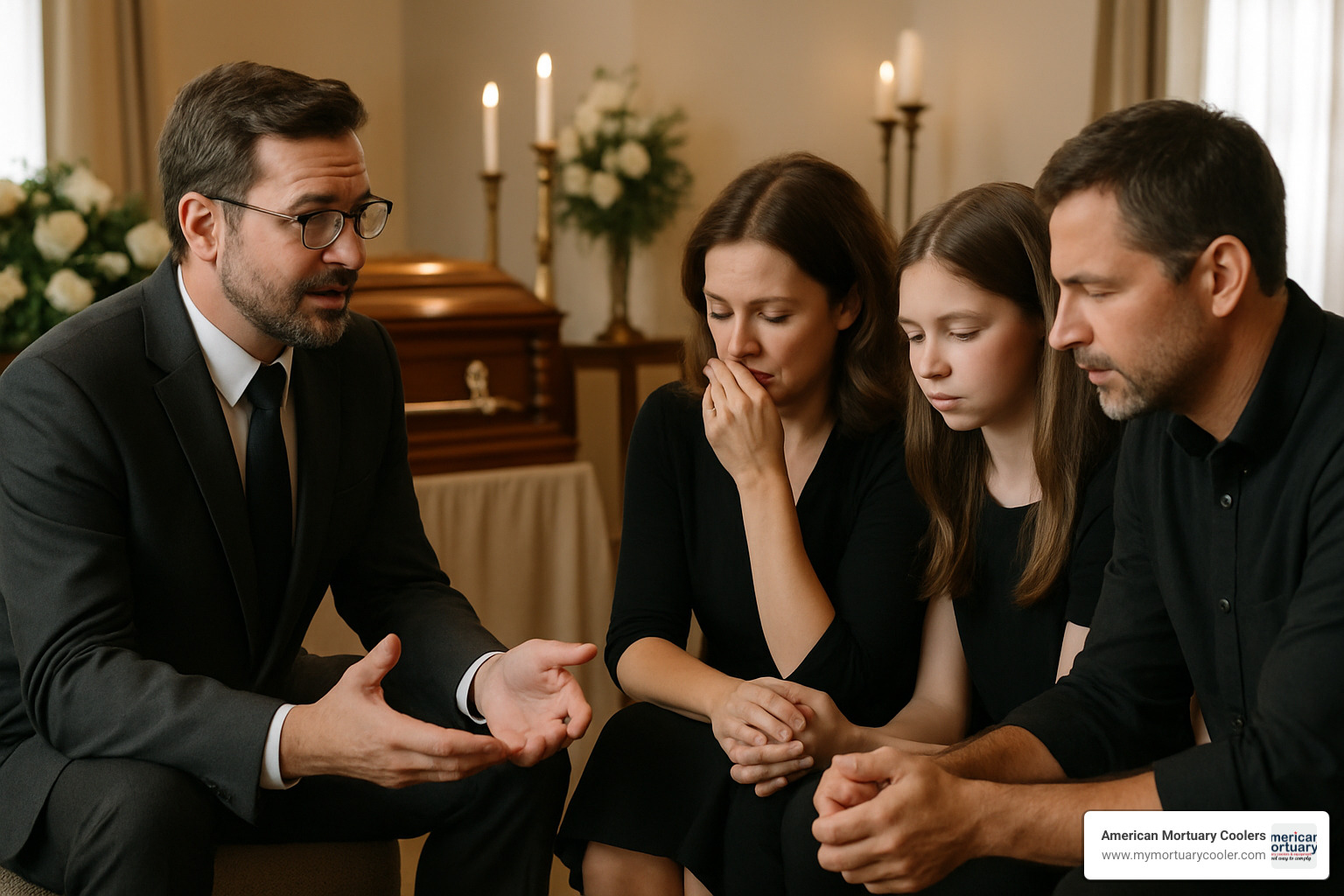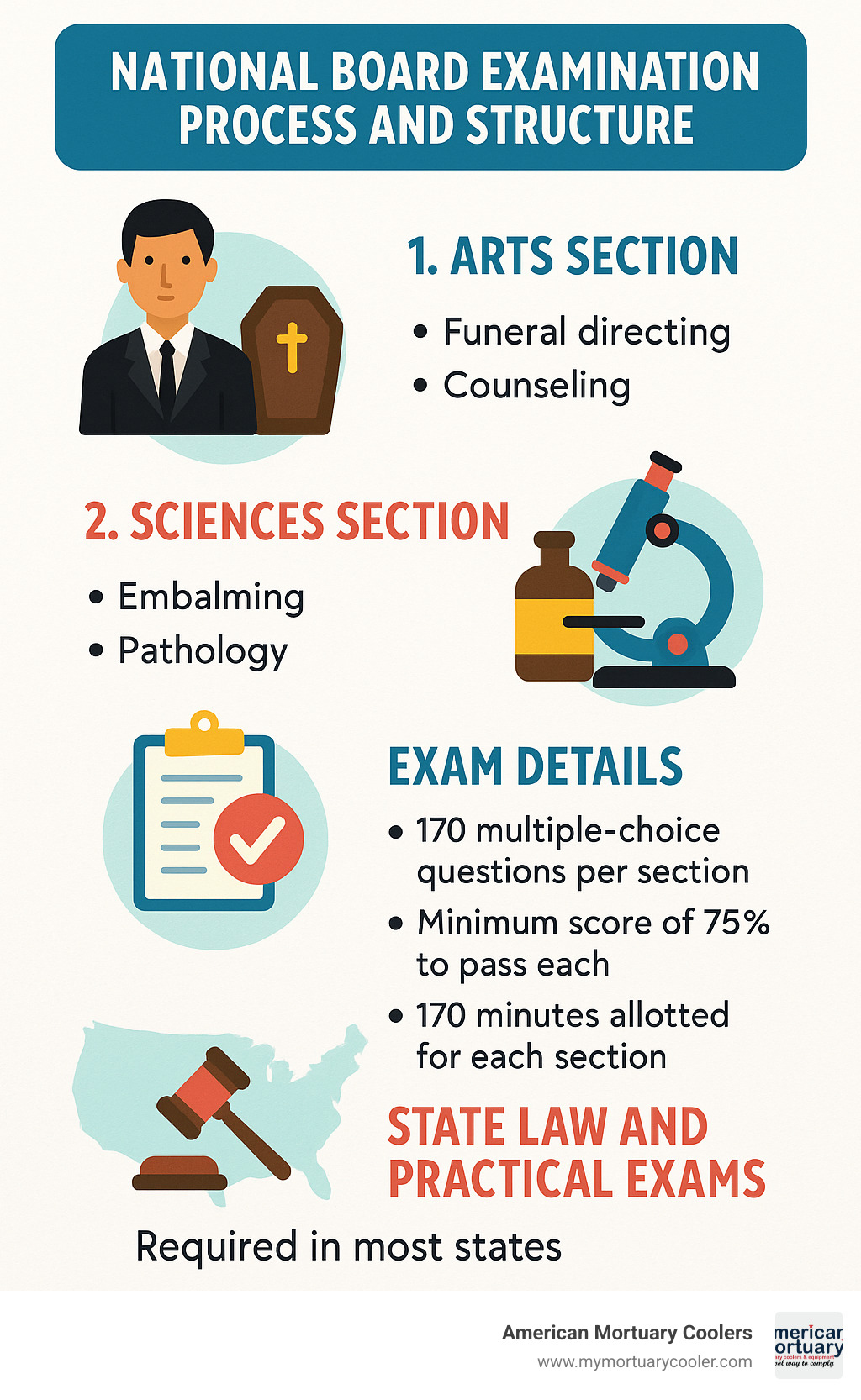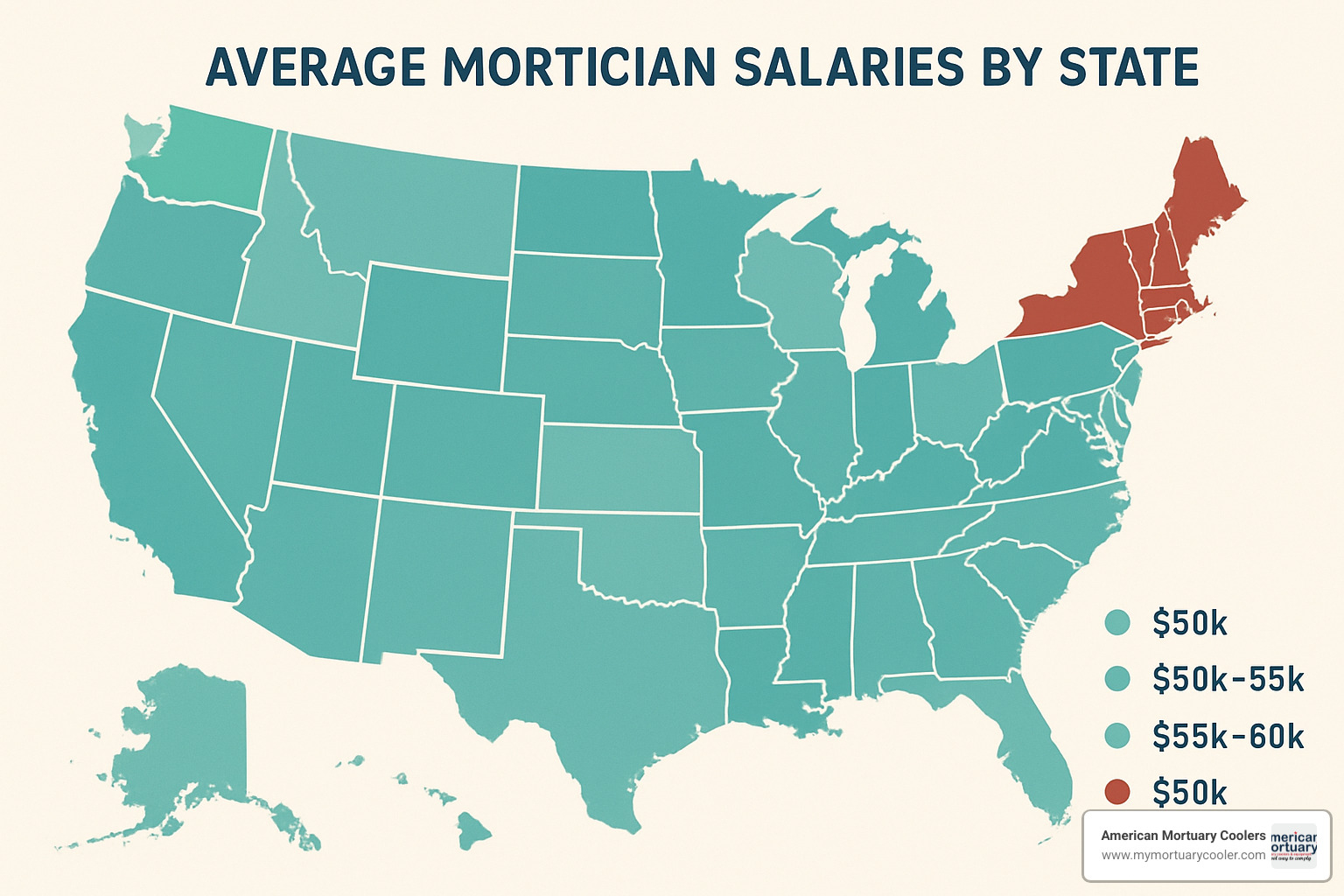
The Complete Guide to Mortician Requirements and Qualification Steps
The Path to Becoming a Mortician: Essential Requirements
What are the requirements to become a mortician in the United States? Here's a quick overview:
- High school diploma or GED
- Associate or bachelor's degree from an ABFSE-accredited mortuary science program
- Apprenticeship/internship lasting 1-3 years (varies by state)
- National Board Examination (minimum 75% score on Arts and Sciences sections)
- State-specific license exam
- Continuing education to maintain licensure
Becoming a mortician requires a unique blend of compassion, scientific knowledge, and business acumen. These professionals support grieving families while handling the technical aspects of death care with dignity.
The journey to becoming a licensed mortician involves several key steps, with requirements varying by state. Most states mandate at least an associate degree from an accredited mortuary science program, followed by a supervised apprenticeship lasting 1-3 years. Candidates must then pass national and state licensing exams.
The median annual salary for morticians was $54,100 in 2020, with top-paying states like Connecticut offering as much as $126,000. The profession offers stable employment with a projected 4% growth rate through 2030.
I'm Mortuary Cooler, a national-level mortuary cooler supplier with experience in the funeral service industry where I've helped countless professionals meet what are the requirements to become a mortician through proper equipment and compliance guidance.

What are the requirements to become a mortician definitions:
What Is a Mortician and What Do They Do?
A mortician is far more than what you might see in movies or TV shows. They're highly trained professionals who guide families through one of life's most difficult journeys. Whether called morticians, funeral directors, undertakers, or embalmers, these individuals blend science, compassion, and practical support into a unique profession.

When someone asks what are the requirements to become a mortician, they're often surprised by the depth of skills needed. Morticians don't just care for the deceased – they become trusted advisors during chaotic times.
Main Responsibilities & Duties
The daily life of a mortician is never routine. Their responsibilities include:
Body transport and preparation - bringing the deceased from a hospital, home, or accident scene to the funeral home with dignity. This includes embalming, restorative art, and applying cosmetics for viewing.
Funeral planning - creating services that reflect the person who has died, coordinating details from music to flowers to video tributes.
Paperwork and legal requirements - handling death certificates, burial permits, and insurance claims. Many also assist with obituary writing.
Community outreach - building relationships with local clergy, medical professionals, and hospice organizations.
Morticians are perpetually on-call, answering middle-of-the-night calls and working holidays when families need them.
Personal Qualities & Core Skills
Successful morticians possess distinctive qualities:
Empathy - the genuine ability to connect with grieving people and provide comfort.
Communication skills - discussing difficult topics with sensitivity and clarity.
Attention to detail - ensuring legal documents are flawless and presentation details are perfect.
Scientific knowledge - understanding anatomy, chemistry, and preservation techniques.
Business acumen - managing facilities, staff, and finances.
Emotional resilience - developing healthy boundaries while remaining compassionate.
What are the Requirements to Become a Mortician (State-by-State Snapshot)
Navigating the path to becoming a mortician varies depending on which state you'll practice in. While there's a common roadmap, local rules can differ significantly.
Universal requirements across all states include being at least 18 years old (some states require 21), having a high school diploma or GED, graduating from an ABFSE-accredited mortuary science program, completing an apprenticeship, passing the National Board Examination and your state's specific law exam, and committing to continuing education.
State variations include education level (associate vs. bachelor's degree), apprenticeship length (1-3 years), and whether separate licenses are needed for funeral directors and embalmers.
Here's a snapshot of five states where we regularly serve funeral professionals:
| State | Education Requirement | Apprenticeship | Exam Fees | Unique Requirements |
|---|---|---|---|---|
| New York | Associate degree | 12 months | $525 | 40 case reports required |
| Texas | Associate degree | 12-24 months | $500 | Separate embalmer license |
| Illinois | Associate degree + 30 college credits | 12 months | $550 | Mandatory ethics training |
| Tennessee | Associate degree | 12 months | $480 | Jurisprudence exam |
| California | Associate degree | 24 months | $600 | Separate funeral director exam |
Location significantly impacts earning potential. Connecticut leads with morticians earning an average of $126,000 – substantially above the national median of $54,100.
State Licensing Boards & Contacts
Each state maintains its own regulatory board that oversees mortician licensing. The International Conference of Funeral Service Examining Boards (ICFSEB) offers a comprehensive directory to connect you with your state board. The National Funeral Directors Association (NFDA) provides valuable resources to help steer requirements.
Contact your state board directly for the most current information, as what are the requirements to become a mortician can change over time.
More info about mortuary science degree
Out-of-State License Transfer
Moving your practice to a new state typically requires a credential review of your current license, education, and work history, proof of continuing education, and passing a jurisprudence exam covering state-specific laws.
Some states have reciprocity agreements with neighboring states. If you've been practicing for 5-10 years, you might qualify for "licensure by credentials" in some states, bypassing certain requirements.
Step-by-Step Path to Licensure
The journey to becoming a licensed mortician follows a clear path, with some variations depending on your state:
- Complete high school or earn your GED
- Research your state's specific requirements
- Complete any prerequisite courses
- Earn an associate or bachelor's degree in mortuary science from an ABFSE-accredited program
- Serve an apprenticeship (1-3 years)
- Pass the National Board Examination and state-specific exams
- Apply for licensure
- Complete continuing education to maintain your license
All told, you're looking at about 3-5 years from starting your education to becoming fully licensed.
Education & Accredited Mortuary Science Programs
The American Board of Funeral Service Education (ABFSE) has accredited about 58 programs nationwide. These programs blend science, technical skills, business knowledge, and compassionate care.
You'll study anatomy and physiology, chemistry, microbiology and pathology, embalming techniques, restorative art, cremation processes, business management, funeral law and ethics, and psychology and sociology.
Programs are available at both associate and bachelor's degree levels. While most states only require an associate degree, a bachelor's degree can give you a competitive edge.
Scientific research on accredited program outcomes
Coursework & Lab Training
Mortuary science education balances classroom learning with hands-on laboratory experience. In the classroom, you'll study anatomy and physiology, chemistry, embalming theory, restorative art, funeral service psychology, and business management.
The laboratory component is where theory meets practice. Under supervision, you'll work with specialized equipment to practice embalming techniques, restoration procedures, and other technical skills.
More info about mortuary science bachelor's degree
Apprenticeship / Internship
After completing your formal education, you'll move into the apprenticeship phase, working alongside a licensed mortician for 1-3 years depending on your state.
You'll gain hands-on experience assisting with embalming, sitting in on funeral arrangement conferences, helping coordinate services, and handling administrative tasks.
Many states require apprentices to document their experience, often specifying a minimum number of cases. Apprenticeships are typically paid positions, with funeral service interns earning an average of $20.98 per hour.
Exam Requirements & Passing Scores
The National Board Examination (NBE) is divided into two sections:
- The Arts Section covers funeral directing, counseling, business law, and funeral service history
- The Sciences Section focuses on embalming, restorative art, pathology, and microbiology
Each section contains 170 multiple-choice questions plus 20 pretest questions. You'll need to achieve a minimum score of 75% on both sections to pass.

Most states also require a State Law Examination covering their specific funeral service laws and regulations. Some states require a practical embalming examination as well.
Exam fees typically range from $400-$600 for all required examinations.
Cost, Timeline, Salary & Career Outlook
Understanding the complete picture—from education costs to long-term earning potential—helps aspiring morticians make informed decisions.
Education Costs
Associate degree programs in mortuary science typically cost between $5,000 and $13,000 per year in tuition and fees. Bachelor's degree programs run around $23,753 total.
Additional costs include textbooks, lab equipment, and supplies ($1,000-$2,000 annually), examination fees ($500-$600), and state licensing fees ($100-$300).
Financial Aid Options
Several financial aid options are available:
- American Board of Funeral Service Education (ABFSE) scholarships
- Traditional financial aid through FAFSA
- Funeral Service Foundation Scholarships
- State-specific incentives, particularly in rural areas
Timeline
What are the requirements to become a mortician in terms of time commitment? You're looking at:
- Associate degree: 24 months
- Bachelor's degree: 4 years
- Apprenticeship: 1-3 years
Total time from start to licensure: approximately 3-6 years.
Salary and Job Outlook
The median annual salary for morticians is $54,100, with a range from $29,370 to over $83,550 depending on experience, location, and position.
Top-paying states include Connecticut ($126,000), Minnesota ($81,630), Massachusetts ($80,580), Indiana ($75,410), and Delaware ($73,460).

Job growth is projected at 4% from 2020-2030. The industry has more practitioners aged 55+ than most occupations, meaning retirements will create openings despite modest overall growth.
The earnings difference between employees and owners is substantial. In New Jersey, licensed funeral home owners reported an average salary of $145,007 in 2022, compared to $68,385 for newly licensed non-owners.
More info about mortician salaries
Maintaining & Advancing Your License
Getting your mortician license is just the beginning of your professional journey. Ongoing education and professional development are essential for career growth.
License Renewal and Continuing Education
Most states require license renewal every one to two years, typically involving:
- 10-12 hours of continuing education annually
- Annual OSHA training
- Renewal fees of $100-$300
Continuing education can be earned through industry conferences, online courses, webinars, college courses, or industry publications.
Missing these requirements can lead to license suspension or revocation, so keeping careful track of your credits is essential.
Specializations & Career Growth Paths
As you gain experience, your career can branch in several directions:
- Cremation Specialist with certification from the Cremation Association of North America (CANA)
- Green Burial Expert - important as 56% of consumers now express interest in green options
- Grief Counseling specialist
- Funeral Celebrant creating personalized memorial services
- Funeral Home Management or Ownership
- Education - teaching at mortuary science programs
- Restorative Art Specialist
Professional certifications add value to your credentials, including Certified Funeral Service Practitioner (CFSP), Certified Preplanning Consultant (CPC), and Certified Crematory Operator (CCO).
Frequently Asked Questions about Becoming a Mortician
How long does it take to become a licensed mortician?
The journey typically takes 3 to 6 years from start to finish. Your associate degree will take about 2 years, while a bachelor's path stretches to 4 years. Then comes the apprenticeship, ranging from 1 to 3 years depending on your state.
Some states offer ways to reduce requirements. For example, New Jersey reduces the apprenticeship requirement from two years to one for those with three years of college education.
Your personal circumstances matter too - studying full-time versus balancing classes with other responsibilities will affect your timeline. Many mortuary programs offer evening and weekend options for working adults.
Can I complete mortuary school online?
Yes, but with limitations. Many ABFSE-accredited programs now offer hybrid formats where theoretical coursework can be completed online. However, some in-person training is absolutely necessary for skills like embalming and restorative techniques.
Typically, hybrid programs structure things like this:
- Theory courses (funeral service history, grief psychology, business management) can be completed online
- Laboratory work and hands-on training require campus visits
- Clinical experiences might be arranged at funeral homes in your local area
No fully online program currently meets accreditation standards. Before enrolling, verify that the program is ABFSE-accredited and recognized by your state licensing board.
What financial aid options exist for mortuary science students?
Mortuary science students have access to several financial support options:
- Free Application for Federal Student Aid (FAFSA) - opens doors to federal grants, loans, and work-study opportunities
- American Board of Funeral Service Education (ABFSE) scholarships ranging from $1,000 to $2,500
- Funeral Service Foundation and National Funeral Directors Association scholarships
- Funeral home sponsorship programs - some funeral homes invest in promising students in exchange for a commitment to join their team after graduation
- GI Bill benefits for veterans
- State-specific grants or loan forgiveness initiatives
More info about mortuary coolers
Conclusion
Becoming a mortician is a calling that goes beyond just career choice. It's a path that asks for your heart, mind, and hands to work in harmony, serving families during life's most difficult moments.
As we've seen, what are the requirements to become a mortician varies by state, but common elements include completing an accredited mortuary science program, gaining hands-on experience through apprenticeship, passing national and state exams, and committing to lifelong learning.
This profession requires the steady hands of a technician alongside the compassionate heart of a counselor. There will be difficult days when emotions run high, but many funeral directors describe the profound privilege they feel in helping families honor their loved ones with dignity.
If you're feeling drawn to this meaningful work:
- Research your state's specific requirements before investing in education
- Reach out to local funeral directors to learn about their experiences
- Visit different funeral homes to get a feel for various work environments
- Honestly assess your emotional capacity for working with grief daily
Here at American Mortuary Coolers, we've been honored to support funeral professionals across the country. From our home base in Tennessee to funeral homes in Georgia, Illinois, and beyond, we understand the critical importance of reliable equipment in providing dignified care. We take pride in crafting custom mortuary coolers that help you serve your communities with excellence.
Whether you're just starting to explore this career path or you're a seasoned professional looking to upgrade your facility, we understand the unique challenges and rewards of funeral service. Our team is committed to supporting your important work with equipment that meets the highest standards.




